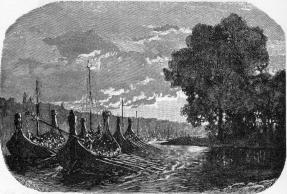
The Wulfings, Wylfings or Ylfings[Note 1] (the name means the "wolf clan") was a powerful clan in Beowulf, Widsith and in the Norse sagas. While the poet of Beowulf does not locate the Wulfings geographically, Scandinavian sources define the Ylfings (the Old Norse form of the name) as the ruling clan of the Eastern Geats.[1]
The Wulfings play an important role in Beowulf as Beowulf's father Ecgþeow of the Wægmunding clan had slain one of its members, and was banished for not paying the weregild. The Danish king Hroðgar, who was married to Wealhþeow, a Wulfing woman, graciously paid the weregild, and when Beowulf arrived at the Danish court in order to slay Grendel, Hroðgar interpreted this as a son's gratitude.
In Old Norse sources, the clan figure prominently in the Heimskringla and in Sögubrot, where Hjörvard and his son Hjörmund belong to it. It is also mentioned in the Lay of Hyndla and in Skáldskaparmál where Eiríkr the Wise was one of its members. However, its most famous member was Helgi Hundingsbane who had two poems of his own (Helgakviða Hundingsbana I and Helgakviða Hundingsbana II), in the Poetic Edda, and whose story is also retold in the Völsunga saga.
Sam Newton and others (including Rupert Bruce-Mitford), have proposed that the East Anglian Wuffing dynasty was derived from the Wulfings, and it was at their court that Beowulf was first composed.[2]
Cite error: There are <ref group=Note> tags on this page, but the references will not show without a {{reflist|group=Note}} template (see the help page).
- ^ Nerman, Birger (1925). Det svenska rikets uppkomst. Stockholm: Generalstabens litografiska anstalt.
- ^ Newton, Sam (2004). The Origins of Beowulf: And the Pre-Viking Kingdom of East Anglia. Boydell & Brewer. ISBN 978-0-85991-472-7.